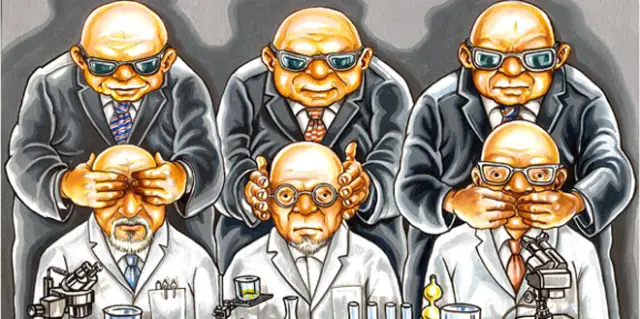Contributing writer for Wake Up World
Corruption undermining science.
In a perfect world, science would have unlimited funding, free from corporations or special interest groups, where all studies would be truly objective and unbiased. Unfortunately, this is rarely the case. Financing by private companies, or those who have a vested interest in the outcome of the research, often leads to biased conclusions which favor the sponsor of the study.
Take for example a pharmaceutical company paying for a new drug to treat depression. When the track record of such research is examined, we find studies backed by the pharmaceutical industry tend to show partiality toward the drug under consideration, whereas research sponsored by government grants or charitable organizations is prone to draw more objective conclusions.¹
In a similar fashion, research financed by the food industry often favors the food under investigation compared to inquiries that are independently sponsored.²
[pro_ad_display_adzone id=”110028″]
Bad science
“Everyone should know that most cancer research is largely a fraud, and that the major cancer research organizations are derelict in their duties to the people who support them.”³ ~ Linus Pauling, PhD, and two-time Nobel Prize winner.
Dr. Marcia Angell, physician and longtime editor in chief of the New England Medical Journal, feels that objective research has taken a turn for the worse:
“It is simply no longer possible to believe much of the clinical research that is published, or to rely on the judgment of trusted physicians or authoritative medical guidelines. I take no pleasure in this conclusion, which I reached slowly and reluctantly over my two decades as an editor of the New England Journal of Medicine.”
And John P.A. loannidis, a professor in disease prevention at Standford University School of Medicine, writes that most published research findings are false, due to several criteria — including “greater financial and other interest and prejudice.” He also states that “for many current scientific fields, claimed research findings may often be simply accurate measures of the prevailing bias.”
Another critique of our current scientific method is found with Richard Horton, editor in chief of The Lancet, who states, “much of scientific literature, perhaps half, may simply be untrue,” in the April 15th, 2015 edition of the journal. He lists a a variety of reasons for this failure: studies with small sample sizes, flagrant conflicts of interest and an obsession for pursuing fashionable trends of dubious importance. Horton adds, “as one participant put it, “poor methods get results.”’
Moreover, ScienceDaily reports that a study at the University of Michigan found that nearly one-third of cancer research published in high-profile journals have conflicts of interest. The research team examined 1,534 cancer studies published in well-respected journals.The most frequent type of conflict is with industry funding (17% of the papers). Twelve percent of the papers were in conflict because the author was an industry employee. And randomized trials were more likely to have positive findings when conflicts of interest were present.
Reshma Jagsi, M.D., D.Phil., and author of the University of Michigan study, feels that “merely disclosing conflicts is probably not enough. It’s becoming increasingly clear that we need to look more at how we can disentangle cancer research from industry ties.”
Jagsi believes that research has become corrupted by designing industry-funded studies in such a manner that’s likely to yield favorable results. Researchers may also be more inclined to publish positive outcomes while overlooking negative results.
“In light of these findings, we as a society may wish to rethink how we want our research efforts to be funded and directed. It has been very hard to secure research funding, especially in recent years, so it’s been only natural for researchers to turn to industry. If we wish to minimize the potential for bias, we need to increase other sources of support. Medical research is ultimately a common endeavor that benefits all of society, so it seems only appropriate that we should be funding it through general revenues rather than expecting the market to provide,” Jagsi says.
When all is said and done, we may question whether privately funded research should be dismissed altogether. Most likely, no. But we can consider the advice presented in Understanding Science by the University of California at Berkeley:
“Ultimately, misleading results will be corrected as science proceeds; however, this process takes time. Meanwhile, it pays to scrutinize studies funded by industry or special interest groups with extra care. So don’t, for example, brush off a study of cell phone safety just because it was funded by a cell phone manufacturer — but do ask some careful questions about the research before jumping on the bandwagon. Are the results consistent with other independently funded studies? Does the study seem fairly designed? What do other scientists have to say about this research? A little scrutiny can go a long way towards identifying bias associated with funding source.”
Article sources:
- ¹Als-nielson, B., W. Chen, C. Gluud, and L.L. Kjaergard. 2003. Association of funding and conclusions in randomized drug trails: A reflection of treatment effect or adverse events? Journal of the American Medical Association 290:921-928
- ²This research focused on studies of soft drinks, juice, and milk. Lesser, L.I., C.B. Ebbeling, M. Goozner, D. Wypij, and D.S. Ludwig. 2007. Relationship between funding source and conclusion among nutrition-related scientific articles. Public Library of Science Medicine 4:41-46.
- ³Outrage! (Oct/Nov 1986): pg. 14.
- Harvey Marcovitch. 2010 Editors, Publishers, Impact Factors, and Reprint Income. PLoS Med. 2010 Oct; 7(10): e1000355
- Reshma Jagsi, Nathan Sheets, Aleksandra Jankovic, Amy R. Motomura, Sudha Amarnath, and Peter A. Ubel. Frequency, nature, effects, and correlates of conflicts of interest in published clinical cancer research. Cancer, Online May 11, 2009; Print Issue Date: June 15, 2009
- http://www.thelancet.com/pdfs/journals/lancet/PIIS0140-6736%2815%2960696-1.pdf
- http://undsci.berkeley.edu/article/0_0_0/who_pays
- https://med.stanford.edu/profiles/john-ioannidis
- http://journals.plos.org/plosmedicine/article?id=10.1371/journal.pmed.0020124
- http://www.sciencedaily.com/releases/2009/05/090511090846.htm
- http://www.collective-evolution.com/2015/05/11/one-of-the-most-important-scientists-in-the-world-most-cancer-research-is-largely-a-fraud/
Previous articles by Carolanne:
- Is Roundup Driving The Autism Epidemic? Leading MIT Researcher Says YES
- Over 100 Scientific Studies Agree: Cannabis Annihilates Cancer
- Emotional Energetic Healing: The Future of Medicine is Here
- Why Every Parent Should Consider Unschooling
- The Greenhouse of the Future: Grow Your Own Food Year-Round With This Revolutionary System
- First U.S. City Produces More Electricity Than It Uses — With 100% Renewable Technology
- Dry Skin Brushing Can Strengthen Immunity, Spark Detoxification and Reverse Aging
- Autistic Boy with Higher IQ Than Einstein Discovers Gift After Removal from State-Run Therapy
- Enhance Spiritual, Mental and Physical Well-being with a Pineal Gland Detox
- DIY $2 Self-Watering Garden Bed – Grow Produce Easily, Even in the Toughest Conditions
- How Being Too Clean Can Lead to Cancer, Multiple Sclerosis, Celiac Disease and More
[pro_ad_display_adzone id=”110025″]
[pro_ad_display_adzone id=”110027″]








